What ICD-10 codes are used for acute renal failure?
Acute renal failure, also known as acute kidney injury, is a serious condition characterized by a sudden decline in kidney function. The ICD-10-CM codes used to classify this condition are essential for accurate medical billing and documentation.
Below are seven commonly used codes for acute renal failure:
N17.0 - Acute kidney failure with tubular necrosis: This code is used when acute kidney failure is caused by tubular necrosis, often due to ischemia or nephrotoxic agents.
N17.1 - Acute kidney failure with acute cortical necrosis: This code is used when acute kidney failure is caused by acute cortical necrosis, typically from severe ischemia or vascular disorders.
N17.2 - Acute kidney failure with medullary necrosis: This code is used when acute kidney failure is caused by medullary necrosis, often resulting from sickle cell disease or ischemic injury.
N17.8 - Other acute kidney failure: This code covers cases of acute renal failure not falling into the previously mentioned categories.
N17.9 - Acute kidney failure, unspecified: This code is used when specific details about the cause of acute kidney failure are unavailable or not documented.
N99.0 - Postprocedural (acute) (chronic) kidney failure: This code is used when acute renal failure occurs as a complication of a medical procedure.
N27.0 - Small kidney, unilateral: This code is used when a patient has a congenitally small kidney on one side, which may predispose them to acute kidney failure.

